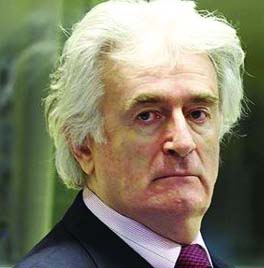
Al Jazeera News :
About 100 survivors gathered outside the UN tribunal in The Hague on Thursday as judges inside read out verdicts in the trial of former Bosnian Serb leader Radovan Karadzic over some of the worst atrocities committed in Europe since World War II.
Karadzic, 70, is the highest-ranking person to face a reckoning before the UN tribunal over a war two decades ago in which 100,000 people were killed as rival armies carved up Bosnia along ethnic lines.
Dressed in a dark suit and looking calm, Karadzic faces rulings on 11 charges including two counts of genocide. He faces a maximum life sentence if convicted. The final verdicts were expected to be read by 1530 GMT.
Outside the court protest banners were carried with one reading: “Srebrenica, we remember the 8,372 victims of genocide.” Karadzic is accused of orchestrating the 1995 slaughter of an estimated 8,000 Muslims after Serb forces seized the UN’s Srebrenica
“safe area” in eastern Bosnia.
“Justice is slow but it’s coming, so we hope that this time the court will have enough courage to say what really happened, because they only need courage, facts they already have,” said war survivor Sakib Ahmetovic.
Karadzic protested his innocence in a rare interview published by the Balkan Investigative Reporting Network on Wednesday. “I know what I wanted, what I did, even what I dreamed of, and there is no reasonable court that would convict me,” he told the website in an email interview.
“The unnecessary killing of a single man is horrifying, let alone certainly several hundred at least… Those who did it are the enemies of the Serbs first, then enemies of those families, then of the Muslim community,” Karadzic said.
To Bosnian Muslims and Croats, Karadzic – who also faces charges over the shooting of civilians in Sarajevo, capital of the former Yugoslavia – is synonymous with war, death and destruction.
Bosnian Serbs, however, view him as a national hero who created a Serb Republic – a state within a state, which survived under the 1995 Dayton peace agreement. Such sentiments are widely shared across the border in Serbia.
About 100 survivors gathered outside the UN tribunal in The Hague on Thursday as judges inside read out verdicts in the trial of former Bosnian Serb leader Radovan Karadzic over some of the worst atrocities committed in Europe since World War II.
Karadzic, 70, is the highest-ranking person to face a reckoning before the UN tribunal over a war two decades ago in which 100,000 people were killed as rival armies carved up Bosnia along ethnic lines.
Dressed in a dark suit and looking calm, Karadzic faces rulings on 11 charges including two counts of genocide. He faces a maximum life sentence if convicted. The final verdicts were expected to be read by 1530 GMT.
Outside the court protest banners were carried with one reading: “Srebrenica, we remember the 8,372 victims of genocide.” Karadzic is accused of orchestrating the 1995 slaughter of an estimated 8,000 Muslims after Serb forces seized the UN’s Srebrenica
“safe area” in eastern Bosnia.
“Justice is slow but it’s coming, so we hope that this time the court will have enough courage to say what really happened, because they only need courage, facts they already have,” said war survivor Sakib Ahmetovic.
Karadzic protested his innocence in a rare interview published by the Balkan Investigative Reporting Network on Wednesday. “I know what I wanted, what I did, even what I dreamed of, and there is no reasonable court that would convict me,” he told the website in an email interview.
“The unnecessary killing of a single man is horrifying, let alone certainly several hundred at least… Those who did it are the enemies of the Serbs first, then enemies of those families, then of the Muslim community,” Karadzic said.
To Bosnian Muslims and Croats, Karadzic – who also faces charges over the shooting of civilians in Sarajevo, capital of the former Yugoslavia – is synonymous with war, death and destruction.
Bosnian Serbs, however, view him as a national hero who created a Serb Republic – a state within a state, which survived under the 1995 Dayton peace agreement. Such sentiments are widely shared across the border in Serbia.

